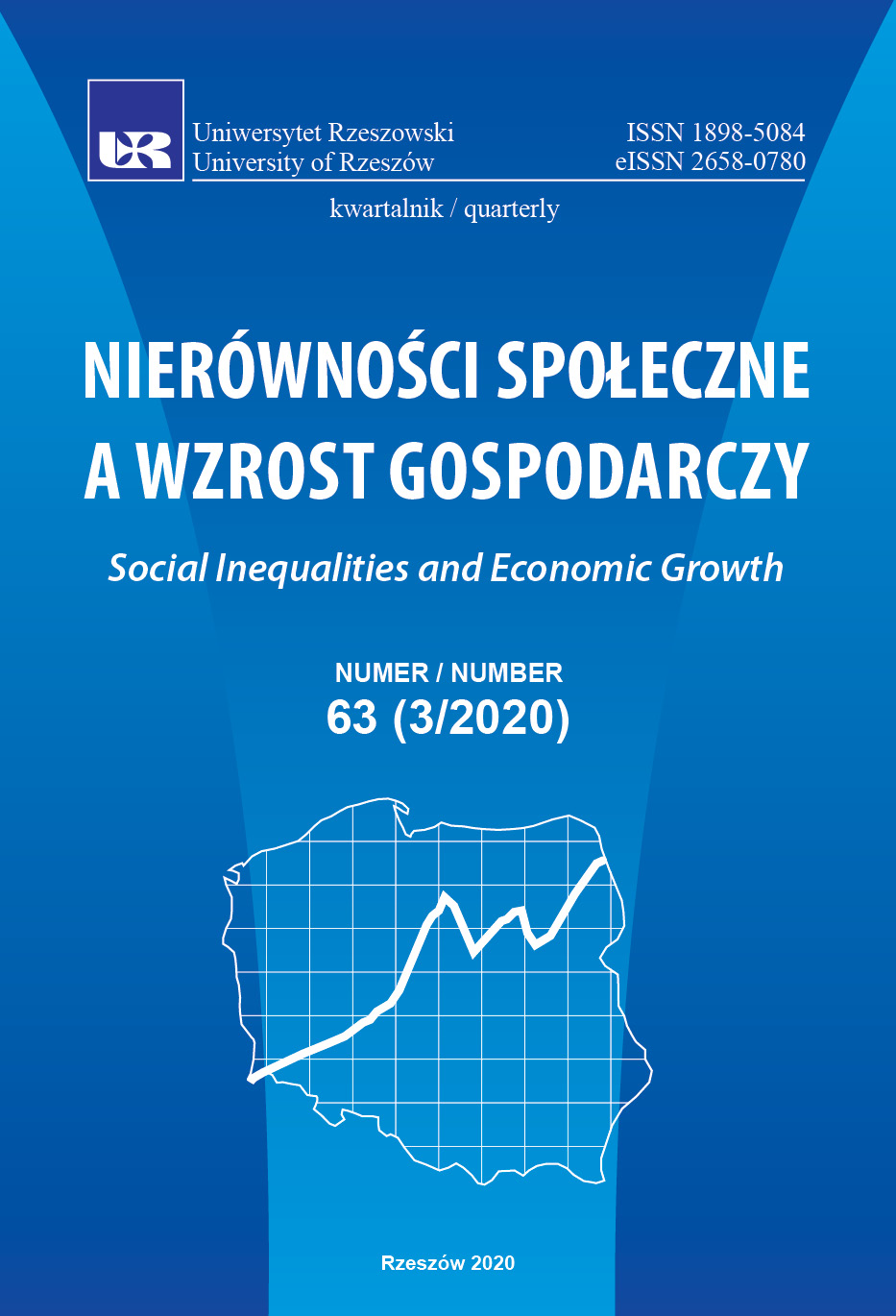Cyfrowe platformy technologiczne – szansa czy zagrożenie dla jakości pracy?
DOI:
https://doi.org/10.15584/nsawg.2020.3.12Słowa kluczowe:
gig economy, cybertariat, pracaAbstrakt
Cyfrowe platformy technologiczne pośredniczące w świadczeniu wielu usług są relatywnie nowym zjawiskiem w gospodarce, szczególnie na rynku pracy. Wraz z poszerzaniem się zakresu ich wykorzystania, stopniowo ujawniają się właściwości tego modelu biznesowego. Tworzy on wiele nieznanych wcześniej możliwości dostępu do dóbr i osiągania dochodów, ale kształtuje też nową jakość pracy. W opisach segmentu rynku pracy rozwijającego się w oparciu o platformy technologiczne w światowej literaturze przedmiotu coraz częściej pojawiają się pojęcia gospodarki fuch (gig economy) i cybertariatu, czyli kategorie o zdecydowanie negatywnym wydźwięku. Artykuł odnosi się do relacji pomiędzy innowacjami technologicznymi a światem pracy. Jego celem jest diagnoza cech pracy realizowanej za pośrednictwem cyfrowych platform technologicznych w przekroju głównych wymiarów jakości pracy. W artykule, przy wykorzystaniu autorskiej metody, poddano weryfikacji hipotezę badawczą stanowiącą, że model biznesowy realizowany przez cyfrowe platformy technologiczne zagraża standardom jakości pracy. Do analizy jakości pracy zastosowano kryteria wypracowane przez European Anti-Poverty Network, stanowiące kwintesencję współczesnego podejścia do tego problemu w Unii Europejskiej. Badanie prowadzi do wniosku, że segment gig economy jest dalece niejednorodny, co utrudnia ocenę i dyskusję nad rodzącymi się problemami i ich rozwiązaniami. Wymaga zatem doprecyzowania za pomocą odpowiednich klasyfikacji i wyodrębnienia grup problemowych. Wyniki badań wskazują jednak na to, że znaczna część gig economy generuje pracę bardzo niskiej jakości.
Downloads
Bibliografia
Bejinaru, R. (2019). Impact of Digitalization on Education in the Knowledge Economy. Management Dynamics in the Knowledge Economy, 7(3), 367–380. DOI: 10.25019/MDKE/7.3.06.
Berg, J., Furrer, M., Harmon, E., Rani, U., Silberman, M. (2018). Digital labour platforms and the future of work. Toward decent work in the online world. Geneva: ILO.
Bogenhold, D., Klinglmair, R., Kandutsch, F. (2017). Solo-Self-Employment, human capital and hybrid labour in the gig economy. Foresight and STI Governance, 4, 23–32.
Bratianu, C., Hadad, S., Bejinaru, R. (2020). Paradigm shift in business education: a competence-based approach. Sustainability, 12(4), 1348. DOI: 10.3390/su12041348.
De Stefano, V. (2016). The rise of the “just-in-time workforce”: On demand work and the labor protection in the” gig economy. Geneva: ILO.
EAPN (2011). 10 principles on quality work. Retrieved from: https://www.eapn.eu/quality-work-for-quality-life-eapn-s-10-principles/ (2019.07.20).
ETUI. Job Quality Index. Retrieved from: https://www.etui.org/Topics/Labour-market-employment-social-policy/Job-quality-index-JQI (2019.07.19).
Graham, M., Hjorth, I., Lehdonvirta, V. (2017). Digital labour and development: impacts of global digital labour platforms and the gig economy on worker livelihoods. Transfer, 23(2), 135–162. DOI: 10.1177/1024258916687250.
Hunt, A., Samman, E. (2019). Gender and the gig economy. Critical steps for evidence-based policy. ODI Working Paper 546.
ILO. Decent work. Retrieved from: https://www.ilo.org/global/topics/decent-work/lang-en/index.htm (2019.07.19).
Kessler, S. (2018). Gigged: the end of the job and the future of work. New York: St. Martin’s Press.
Kuhn, K. M. (2016). The Rise of the “Gig Economy” and Implications for Understanding Work and Workers. Industrial and Organizational Psychology, 9(1), 157–162. DOI: 10.1017/iop.2015.129.
Lepanjuuri, K., Wishart, R., Cornick, P. (2018). The characteristics of Those in the gig economy. Department for Business, Energy & Industrial Strategy. Final report.
Leschke, J., Watt, A. (2008). Job quality in Europe. Brussels: European Trade Union Institute for Research, Education and Health and Safety.
Merkel, J. (2019). Freelance isn’t free. Co-working as a critical urban practice to cope with informality in creative labour markets. Urban Studies, 56(3), 526–547. DOI: 10.1177/0042098018782374.
Minter, K. (2017). Negotiating labour standards in the gig economy: Airtasker and Unions New South Wales. The Economic and Labor Relations Review, 28(3), 438–454. DOI: 10.1177/1035304617724305.
Neamtu, D., Hapenciuc, V., Bejinaru, R. (2019). The Impact of Digitalization on Business Sector Development in the Knowledge Economy. Proceedings of the International Conference on Business Excellence 2019, Bucharest, Romania, 13(1), 479–491. DOI: 10.2478/picbe-2019-0042.
Ostoj, I. (2019). The growth of the gig economy – benefits and treats to labor. Economic and Social Development. 41st International Scientific Conference on Economic and Social Development Book of Proceedings, 23–24 May 2019, Belgrade, 386–394.
Prassl, J. (2018). Humans as a service. Oxford: Oxford University Press.
Schwellnus, C., Geva, A., Pak, M., Veil, R. (2019). Gig economy platforms: boon or bane? Economic Department Working Papers No. 1550. Geneva: OECD.
Spreitzer, G. M., Cameron, L., Garrett, L. (2017). Alternative Work Arrangements: Two Images of the New World of Work. Annual Review of Organizational Psychology and Organizational Behavior, 4, 473–499. DOI: 10.1146/annurev-orgpsych-032516-113332.
Stanford, J. (2017). The resurgence of gig work: Historical and theoretical perspective. The Economic and Labor Relations Review, 28(3), 382–401. DOI: 10.1177/ 1035304617724303.
Stewart, A., Stanford, J. (2017). Regulating work in the gig economy: What are the options? The Economic and Labor Relations Review, 28(3), 420–437. DOI: 10.1177/ 1035304617722461.
Tassinari, A., Maccarrone, V. (2017). The mobilization of gig economy couriers in Italy: some lessons for the trade union movement. Transfer, 23(3), 353–357. DOI: 10.1177/1024258917713846.
Todoli-Signes, A. (2017). The „gig economy”: employee, self-employed or the need for a special employment regulation? Transfer, 23(2), 1–13. DOI: 10.1177/1024258917701381.
Wood, A. J., Graham, G., Lehdonvirta, V., Hjorth, I. (2019). Good Gig, Bad Gig: Autonomy and Alghorithmic Control in the Global Gig Economy. Work, Employment and Society, 33(1), 56–75. DOI: 10.1177/0950017018785616.
Pobrania
Opublikowane
Jak cytować
Numer
Dział
Licencja
Prawa autorskie (c) 2020 Uniwersytet Rzeszowski

Utwór dostępny jest na licencji Creative Commons Uznanie autorstwa – Na tych samych warunkach 4.0 Miedzynarodowe.


